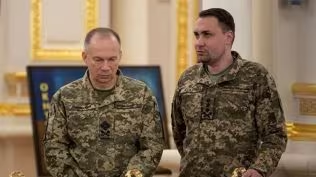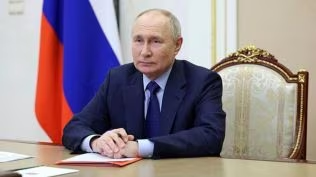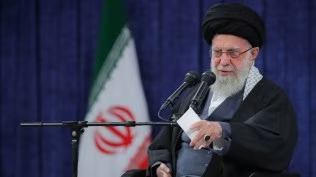Pakistan election results 2024: Army behind him, Nawaz Sharif reaches out to PPP for a govt and keep Imran out
PAKISTAN ARMY’S favoured candidate, three-time Prime Minister Nawaz Sharif, reached out to rivals PPP, led by the Bhutto-Zardari family, on Friday to form a coalition government as both parties trailed Imran Khan’s PTI-backed candidates in the parliamentary election results.
“We don’t have enough of a majority to form a government without the support of others and we invite allies to join the coalition so we can make joint efforts to pull Pakistan out of its problems…. I don’t want to fight with those who are in the mood for fighting… We will have to sit together to settle all matters,” Sharif told supporters Friday night.

He said he was sending his brother and former premier, Shehbaz Sharif, to meet the leaders of other parties and invite them to join the coalition.
The outreach came on a day Independent candidates backed by Imran Khan’s party emerged as the single largest bloc in parliament – an indicator of the jailed former Prime Minister’s popularity and a strong message from the people of Pakistan to the all-powerful Army.
According to the latest Election Commission of Pakistan data, results of 226 constituencies out of 265 were declared. Independent candidates, mostly backed by the PTI, bagged 92 seats while PML-N got 64 and PPP 50. Smaller parties secured 20 seats, news agencies from Pakistan reported.
To form a government, a party must win 133 seats out of 265 in the National Assembly, Pakistan’s parliament. Election to one seat was postponed after the death of a candidate.
Despite the lack of level-playing field in the elections in which Khan and his party faced the wrath of the Army since the May 9 protests last year, candidates backed by the PTI — which did not have its electoral symbol, the iconic cricket bat — led the results. The PTI was forced to fight the polls on symbols allocated by the Election Commission of Pakistan, and its candidates were called PTI-backed Independent candidates.
Overall, 169 seats are needed to secure a simple majority out of the total 336 seats, which include reserved slots for women and minorities. And remaining 70 seats — apart from the 266 directly contested seats — are given to political parties, proportionately based on their performance in directly contested seats. It is here that PTI will lose out. It won’t get these 70 seats since it is currently a party of Independent candidates. Sharif’s PML(N) and Bhutto-Zardari’s PPP will get the lion’s share.
The delay in the declaration of results, shutting down of Internet and mobile services on Friday led to allegations of massive rigging. Some sure-shot winnable candidates from PTI, who were leading by more than 50,000 votes, found they had lost. Panelists in TV debates in Pakistan said the slogan “vote ko izzat do” (respect the ballot) has been shred to pieces.
The outcome means that the Army was propping up a Nawaz-Bhutto-Zardari coalition, along with help from deserters from PTI’s breakaway faction, that would keep Khan’s party away from the Prime Minister’s office.
The view among many Pakistan’s analysts was that Sharif and Bhutto-Zardari not getting enough numbers actually works well for the Pakistan Army since none of them will be in a commanding position and will be subservient to the establishment. Also, the strong showing by the PTI-backed candidates can be spun by the Pakistan establishment as evidence of the fact that it was not a sham election.
But the message from the people on the streets of Pakistan was clear: the establishment – as the Army is frequently referred to in the local media – has been challenged in a manner it is not used to.
The Army has had an outsized role and influence in running the affairs in Pakistan, and there has been a chequered history of military rule in the past. Ayub Khan, Yahya Khan, Zia-ul-Haq and Pervez Musharraf ruled the country, and some of them had wrested power by deposing elected governments. One former Prime Minister was hanged as well.
But the 2024 elections, being held in the age of mobile phones and social media, an empowered and vocal youth (46% of the electorate), an electorate fed up with the economic mess battling 30% inflation, and a high number of women voters (about 47% of the total electorate), have turned out to be unpredictable for the venerable Pakistan establishment to handle.
The outcome tilted in favour of the combination of Sharifs and Bhutto-Zardaris, both ambitious dynasty-families, but the fact that the people turned out in large numbers to vote — responding to the call of their maverick leader Imran Khan – is a challenge to the status quo.
Khan, himself a candidate handpicked by the Army who was being groomed since 2013 and was famously “selected” in the last 2018 elections after Sharif was ousted, ironically fell out of favour of the Pakistan’s generals as he challenged them.
Last year’s May 9 protests following Khan’s arrest, in which PTI workers and supporters entered military installations including a Pakistan Army’s general’s residence, was a shock to the otherwise untouchable establishment.
This brought on the wrath of the Pakistan military — but there was talk that the military itself was divided, as Khan was one of their own till yesterday. The military, however, closed ranks and came down hard on Khan and his party.
Since then, his party leaders and workers were arrested, harassed and intimidated. So much so that a group of PTI leaders led by Khan’s close aide, Jehangir Tareen, deserted the party and formed a new political outfit, Ishteqam-e-Pakistan Party. This new party had the blessings of the Pakistan Army, and has got a handful of seats, and are expected to be part of the ruling coalition with Nawaz-Bhutto-Zardari.
The PTI subsequently lost its election symbol, the cricket bat, and its candidates had to contest on different symbols in constituencies. So, effectively, they were PTI-backed Independent candidates with local symbols.
With the final outcome of Pakistan’s elections awaited, the message would have reached the GHQ in Rawalpindi, where the most powerful man in Pakistan, Army chief Gen Asim Munir, sits in his office. How he responds to this challenge to his authority will shape Pakistan’s future.
Pakistan Election Result 2024 Live Updates: Amid fractured mandate, Sharif’s PML-N in talks with Bhutto-led PPP to form coalition
Disclaimer: The copyright of this article belongs to the original author. Reposting this article is solely for the purpose of information dissemination and does not constitute any investment advice. If there is any infringement, please contact us immediately. We will make corrections or deletions as necessary. Thank you.





